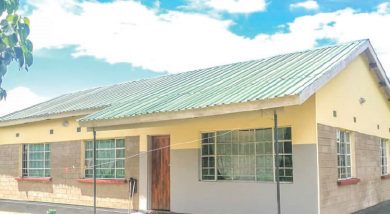Malawians struggle amid rising living costs
When Jervis Mhango travels to Mzuzu from his duty station in Mzimba rural, he feels the pinch in his pocket.
As a teacher at Engcongolweni Primary School in Traditional Authority Mtwalo, he cannot avoid this K5 000 round trip to access his salary at the bank.
Mhango, who has a wife and child as well as supports his extended family, says he is struggling to pay his bills and buy basic needs due to the ever rising cost of living
Narrates the teacher: “My salary is around K140 000, and out of that I spend K5 000 on transport to Mzuzu, pay rent and feed my family. I also pay school fees for some extended family members and take care of other expenses.”
According to Mhango, he pays K25 000 for rent, K10 000 for water and electricity bills, K25 000 for minibus fare to and from work, and at least K50 000 for groceries, among other expenses.

“At the end of the day, I remain with nothing. I work for consumption and there is no way I can improve my life. All my money goes towards food and it is hard for me to meet my other basic needs,” he laments.
Rising fuel, water and food prices have pushed up the cost of living in the country, leaving many Malawians struggling to make ends meet.
Last month, the Malawi Energy Regulatory Authority announced increases in fuel prices by an average 22 percent, while prices of cooking oil have gone up by over 70 percent.
As Malawians were nursing the fuel and cooking oil price increase, the country’s water boards last week announced that they have raised water tariffs by an average 52 percent.
Then, the Malawi Housing Corporation (MHC) pulled a shocker on Thursday by raising some of its rentals.
On top of all these price increases is the introduction of other taxes like value added tax (VAT) on some banking services and toll gate fees for those travelling between Blantyre and Lilongwe.
All these have affected costs of some of the basic needs that drive the economy, while most consumers have to adjust their lifestyles as their incomes are not increasing along with the cost of living.
In its September 2021 Urban Basic Needs Basket Report, the Centre for Social Concern (CfSC), a faith-based organisation that facilitates critical reflection and action on issues of social concern, observes that the rising prices of goods and services will push the majority of low income earners into abject poverty.
In an interview this week, CfSC economic governance programme officer Bernard Mphepo says a family of six in July this year needed K207 000 a month to survive, up from K164 000 in June 2020, when the Tonse Alliance took over the country’s governance after winning the fresh presidential election.
He said: “The increase is expected to continue for the next six months. What is sad is that the cost of living has been increasing during the harvest period, unlike in the previous years when it would decline from April to September.”
Mphepo further lamented that there has been no increase in the minimum wage despite an increase in the cost of living and the depreciation of the kwacha.
Consumer body hopeless
On his part, Consumers Association of Malawi executive director John Kapito has described the situation as hopeless.
The vocal consumer rights body says there is nothing his organisation can do on government policies that are leading to depreciation of the local currency, lack of employment and high imports.
Said Kapito: “I am one of the victims of the high living costs. We will be engaging government authorities on the rising cost of living. Government is the only one that can help us out of this mess.
“The challenge in Malawi is that people do not speak out with one voice but leave it for an individual.”
Recently, some citizens took to the streets in protest against the rising cost of living.
However, Kapito says demonstrations are not sustainable.
“All we need to do is to speak with one voice,” he says.
The rise in prices of goods is expected to continue.
The International Monetary Fund has projected Malawi’s 2021 annual inflation to average 9.5 percent due to the Covid-19 pandemic-related supply and demand mismatches and higher commodity prices.
Meanwhile, University of Malawi economics professor Ben Kaluwa has argued that although the rise in prices is a global phenomenon, Malawi should address its own problems.
He said: “Let us address the supply chain problems. After lockdown that came due to Covid-19, demand is going up.”
Kaluwa said Malawi has always had supply chain problems even before Covid-19, adding the country also needs to scale up agriculture production to produce more raw materials such as soya.
“Soya is one of the raw materials in producing cooking oil, for example; hence, if we produce a lot, cooking oil producers will have ready raw material, thereby reducing demand on forex for imports” he said.
Other economic experts have urged Malawians to employ austerity measures and not wait on government to improve the situation as that may not happen soon.
Edward Masoambeta, an economics lecturer at the Catholic University, says individuals and households should learn to budget within their disposable incomes and strictly spend within it.
He said: “Every single day, one should reconcile their budget with their bank account or income earned, and make sure every expense aligns. This will keep them in-tune with their expenses, and their eyes open to areas where they can reduce their spending.”
Masoambeta further advises Malawians to avoid debts, especially from loan sharks.
“This is one of the ways to reduce your cost of living. Though one of the most difficult tasks, it is by far the best way to add some financial margin to your life. Only debts on sustainable investments should be tolerated with caution.
“After all, interest rates are already high even from informal institutions which hand-caps spending in situations of rising cost of living like we are in,” he explains.
On his part, Lucius Cassim, a University of Malawi lecturer in economics argues that even if they apply financial prudence, most households will still continue to experience tough times due to high prices of basic needs.





